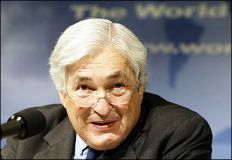World Bank urges end to border row for Ethiopia to get more aid
ADDIS ABABA, Oct 20, 2004 (The Reporter) — The president of World Bank, James Wolfensohn [photo], says Ethiopia’s unresolved border dispute with Eritrea is casting a dark shadow over the government’s ”first rate” handling of the economy, and this would need to be peacefully settled for the country to get more aid to implement its ambitious policies.
 Speaking to journalists at the end of his four-day visit to Ethiopia, Wolfensohn lauded the economic policies of the government as the best in Sub-Saharan Africa and said that these would enable the country to reach the Millennium Development Goals (MDGs) by 2015 except that they would need a lot of resources to be fully implemented.
Speaking to journalists at the end of his four-day visit to Ethiopia, Wolfensohn lauded the economic policies of the government as the best in Sub-Saharan Africa and said that these would enable the country to reach the Millennium Development Goals (MDGs) by 2015 except that they would need a lot of resources to be fully implemented.
But, according to him, these resources would more readily come to Ethiopia if this ”dark shadow” is lifted by settling the dispute peacefully and as soon as possible. Reiterating his belief that ”Ethiopia must succeed for Africa to succeed”, the World Bank president said:
”I just hope that somehow you can develop an atmosphere of peace…because I think that is the one critical issue standing in the way of this partnership (between donors and the government.”
Wolfensohn, who confessed to having no intention of meddling in the domestic politics of Ethiopia, could not, however, say by what means this issue can be resolved.
Asked whether the bank’s report that per capita income had shrunk over the last ten years indicated that there is something fundamentally wrong with Ethiopia, the president of the bank answered in the negative and said that the prevalence of conflicts and the hugely difficult task of turning around a country which has been on a brink of ”real disintegration” may have contributed in the decline of that economic indicator. He further reaffirmed his opinion that ”this government is on an absolutely first rate path to growth”.
”I have not seen a better plan in Sub-Saharan Africa,” he added.
Material from the BBC Monitoring Service
